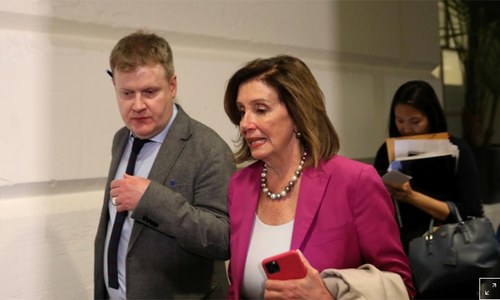THE Western world has been itching to have a Third World War. The First World War of 1914-18 was a sort of hors d’oeuvre, so filling a dish as to make them lose their appetite for another course. Yet, between 1939-45, civilised nations across the Atlantic and the Pacific attacked each other with the ferocity of carnivores, ravenous for the taste of each other’s flesh.
No one at the post-war Potsdam conference of 1945 promised the survivors that there would never be another conflagration on such a mass scale. Quite the reverse, the three leaders of the United States, Russia and the United Kingdom thought it best to reconfigure their future enemies for more conflicts.
Yesterday’s enemies have become today’s co-conspirators. Germany with its clockwork army and Japan with its clockwork economy are using their declared pacifism to their advantage. They watch, as does Russia and China (one suspects with derision), the United States blunder from one macabre theatre of war to another comédie noire — Lebanon, Cuba, the Dominican Republic, Vietnam, Cambodia, Laos, Afghanistan, Iraq, Syria, Libya, ad nauseam. It may well extend to Iran — if the hawks perched in the Pentagon have their way.
The recent fatal attack on the Iranian Maj-Gen Qassem Soleimani at Baghdad airport ordered by President Trump has been compared to president Obama’s televised elimination of Osama bin Laden in 2011. It differs, for one significant reason: president Obama’s SEALs pumped bullets into a political corpse; President Trump’s drones have resurrected Iranian nationalism.
Remaining neutral in such a volatile situation is not an option.
How the Iranian leadership will react to this latest provocation only Tehran knows. As a first overt step, it has announced that it is no longer bound by the nuclear agreement it signed in 2015 with the strong-arm powers led by the United States. Future actions will be calibrated to cause the maximum damage to vulnerable interests of the United States and its allies.
Moved to the top of US allies is Israel. One can understand the exultation with which Israeli Prime Minister Netanyahu received the news of Soleimani’s assassination. He had been informed of the US plans before the attack. The United Kingdom learned about it afterwards. Trump is repaying Boris Johnson’s aloofness for distancing himself from Trump during the recent UK general election. Johnson wanted to be seen as being his own man. Trump has shown Johnson that he does indeed stand on his own — alone, bereft of the Commonwealth, separated from Europe, and on the wrong side of the Atlantic. The torch of the special relationship with the United States has been passed across the English Channel to the Sea of Galilee.
Now that President Trump has begun his re-election campaign for a second term with this incendiary challenge to Iran, countries like ours will be called upon yet again to declare their loyalties. In September 2001, following the 9/11 attacks, president George W. Bush declared to a joint session of Congress: “Every nation, in every region, now has a decision to make. Either you are with us, or you are with the terrorists.” We chose. Yet, even after 19 years, our loyalties are still suspect.
Now, we will have to decide again which side to align with. Remaining neutral in such a volatile situation is not an option. As the South African humanitarian Archbishop Desmond Tutu wrote: “If you are neutral in situations of injustice, you have chosen the side of the oppressor.”
Not that we matter anymore to the United States. It knows that our state no longer has a foreign policy, only foreign real estate. Our all-weather relationship with the Chinese is cooling to a Himalayan temperature; our connection with Russia is locked in a Siberian winter; our relations with India are an unending divorce with a decree nisi — the unfulfilled condition being a resolution of the Jammu & Kashmir dispute.
Never in our history has our country needed strong, commanding leadership as today. Instead we have a prime minister whose forays into personal diplomacy between Iran and the Saudis have been negated. We have a military leadership which is beholden to the whims of parliamentary parties that have extended their unanimous support, at a price. The government and national institutions are riven by dissension, each an ambitious power centre. One is reminded of Kahlil Gibran’s prescient poem: “Pity the nation divided into fragments, each fragment deeming itself a nation.”
There are some optimists who see a glass half-full as a sign of hope. Others take comfort that at the highest level of our governance, there is an overt admission of the reality of power, reinforced by legislation. There are still a few who regret that everyone who matters in Pakistan is now on the same blank page.
The writer is an author and historian.
Published in Dawn, January 9th, 2020

















































